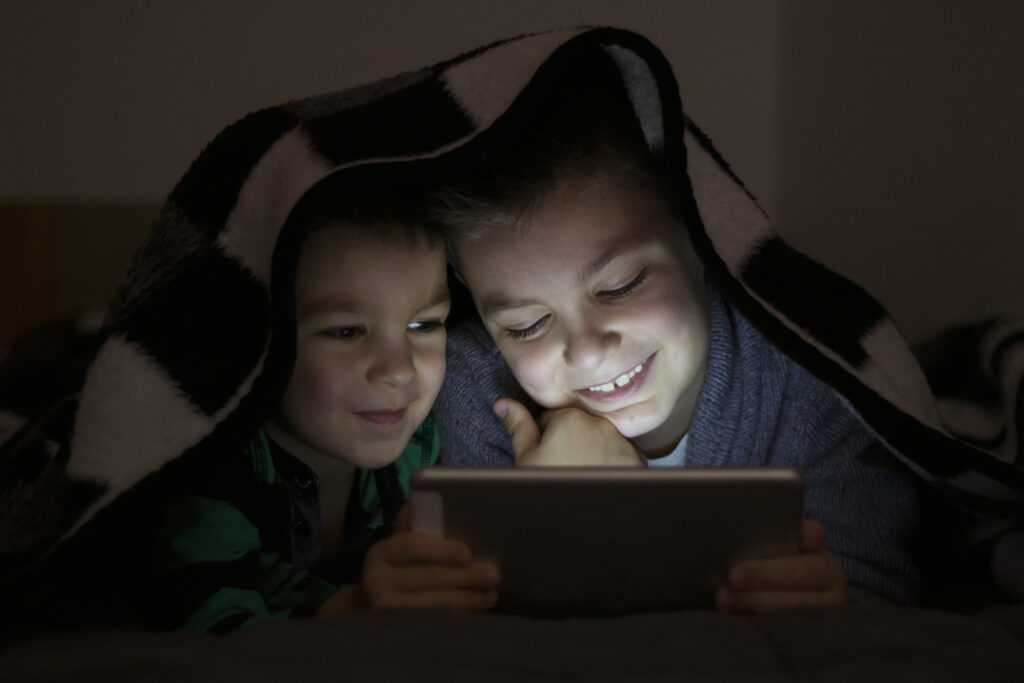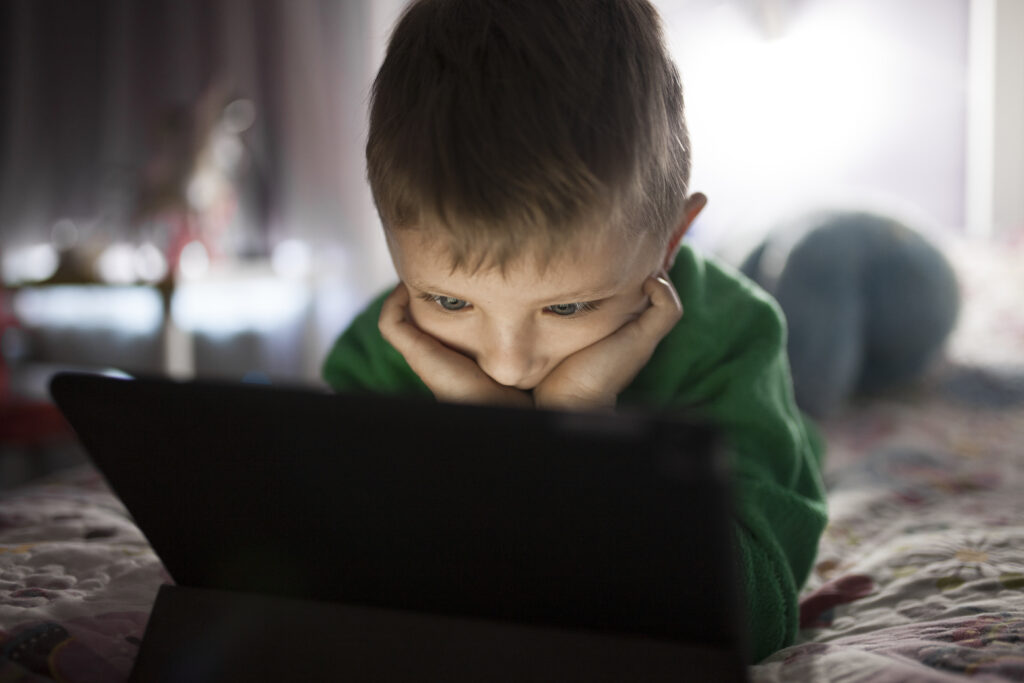In a study by the University of Michigan Center for Human Growth and Development, they tested the impacts of screen use on children belonging to 4-11 years and asked parents and caregivers about their children’s screen time issues.
Go through these warning signs and if you can resemble it with your child’s routine activities, then it’s time to buckle up and reduce screen time:
- Your child searches for a Smartphone right after waking up from bed.
- The moment you ask them to turn off the device, they get angry or throw tantrums.
- He/she is always thinking or talking about their favourite video games or request you to give your mobile, now and then.
- Your child is happy playing games or watching videos and feels angry or anxious without a mobile.
- Your child prefers being indoors with a smartphone and rarely moves or play outdoor games.
- You are getting more complaints of constant headache and/or neck pain.
Effects of Screen Time on Children
If this is the case with your child like most of the children in the world, then it’s high time to take away the glowing device from their hands. Best English medium schools in Vadodara also recommend strong parental guidance.
Many children-based apps and videos inspire them to learn and explore new things, but on the contrary, these multiple modes of media like smartphones, TVs iPads, computers are leading to various health issues such as obesity, sleep disorder, behaviour problems, hyperactivity, mental health, psychosocial health, poor well-being, etc.
This doesn’t end here.
Researchers say that screen time has become ‘inescapable in our lives’ and hugely impacts the child’s brain and health. The World Health Organization (WHO) has recognized a new disease titled ‘gaming disorder’ in its 11th edition of the ‘International Classification of Diseases’.

Screen time hugely affects the psychological and behavioral functioning of your child which can be reflected in its academic performance and day-to-day behavior. Head down to know the effects of mobiles on your child’s overall health, especially the brain.
Screen Time can Affect Neurological Functioning by Increasing:
- stress
- anxiety
- impulsivity
- time to complete tasks
- off-time task
- frustration
Neurobiological Effects:
- pleasure and addiction obtained due to the repeated release of dopamine.
- the decrease in focus and attention.
- exposure to light blue colour of the screen shuts down the release of melatonin (a natural hormone that brings sleep).
- sleep deprivation.
- increase in arousal.
- sensory overload.
These lead to:
- shrinking of the grey matter (a main component of the central nervous system)
- insula damage (loss of libido and ability to tell fresh food from rotten)
- shrinking the frontal lobe (making choices, planning and organizing)
- striatum shrinkage (helps in self-controlling one’s emotions and behaviours)
- loss of white matter integrity (lower gait performance).
- inefficient cognitive functioning
- depression
With all its negative impact on the child’s socio-economic development, it is the responsibility of the parents to take some time out of their busy schedule and find ways to manage screen time. Many parents would be having a hard time running behind their children and may even lead to parenting issues like these:
- Your child will not keep the phone is just one order. This leads to ‘power struggle’ between parents and children wherein both are imposing their power over each other but all goes in vain. In the end, there are conflicts and debilitating family.
- Family conflict is a major issue wherein every time you see your child with the phone, it leads to arguments, yelling, manipulation and resistance.
- The other side of the coin is co-parenting conflict where both parents have different rules, thoughts, limitations related to screening time leading to conflicts between parents that eventually sends a diplomatic or mixed message to the child.
- Decreases trust, communication and result into disengagement.
The next obvious question is: How to save your children from screen addiction and also improve parenting skills?
It’s Time to Set the Right Screen use Time!
The National Foundation of Sleep suggests 9 hours of sleep while the American Medical Association recommends 1-2 hours of screen time per day. It also stresses on creating an electronic-free zone to escape mobile distractions. It is also important to have frequent breaks while working at a stretch on the computer.
Are you planning to set a screen time routine? Read this!
5 Ways to Manage Screen Time:
Why reduce screen time? Instead, make it valuable!
Set up mini-goals and reward them with screen time accordingly. Like, provoke them to exercise or help with household chores or just ask them to read a book in return of screen time.
Encourage them to go outside and get drenched in the rain or play with a street dog- in this case, they would be rewarded with more screen time. This may sound silly, but there is a huge difference in watching cartoons on YouTube and preparing DIY gifts.
Strong parental vigilance is a must while your children are on smartphones. It is not about the how of time on screen but what the child is viewing is important!
This will surely reduce power struggles and other parenting issues. While telling your children, a parent should limit their screen time too. After all, children learn from their parents.
Instead of creating no-screen-time traditions, spend more time with your children. Spend a Sunday on the beach or plan a picnic. Your attention is the biggest weapon that can fight screen time usage.
Books
Instead of gifting a smartphone to your young ones (below 18 years), build a stack of books, puzzles, quizzes, legos, canvas with multiple watercolors, or sports equipment of his/her choice. Instead of imposing rules over using screen time, find a balance to give a few hours to him/her watching videos or playing games after working hard at school.
Plan Weekend Activities in Advance
To reduce mindless scrolling, pre-planning weekend activities do work. Just like you, your child is also tired and needs a break. Instead of being all lazy at home and switching channels on TV, a short trip to the museum or strolling at the zoo can be much more refreshing as you return to discuss the history or evolution of dinosaurs.
Motivate Children to Talk Face-to-Face
When your child is small, restrictions on-screen time is okay but once they grow older, their means of communication is more with the virtual world, rather than taking time to speak with their parents. Cultivate a habit to have face-to-face communication or set a boundary to avoid using devices at meals, occasions or family activities. It is important for them to know how to communicate in the real world.
Speak to them about the Pros and Cons
After dinner, just sit and explain the potential dangers of playing video games, movies for a longer period. Expose them to online predators and how they trap young children. A short documentary will work too. Have a brainstorming session and ask them to set a fixed time to use devices.
Being angry won’t work, try being calm and have a heart-to-heart conversation with them. Let them decide their screen time instead of imposing your rules. Head down to replace your devices with these handy and must-have tools.
Resources to Limit Your Child’s Screen Time
How about using tools or resources that can reduce screen time? Instead of googling a synonym or going to the encyclopedia, give access to handy resources like:
- Encyclopedia
- Dictionary
- Atlas
- Math reference book
- Local library card
- Handbook to science experiments
Bottom line
There had been several pieces of research done to understand how screen time affects the child. Research by the University of California at San Diego scanned teenagers’ brains while they scrolled their Instagram accounts. It revealed that these electronic devices stimulated the release of dopamine- a hormone responsible for cravings and desire.
While another study found that teenagers using phones at night are at risk for sleep disturbances and depression. Substantial researchers at the University of Pennsylvania suggested that children who reduce their screen time to less than 30 minutes are less lonely and depressed.
These devices are melting our child’s brain. Watch out before it’s too late!
Nalanda International School offers child-friendly atmosphere, activities and values. Also, known as the ‘best English medium school in Vadodara’. We are adamant in providing child-friendly methodology apt to suit the curriculum needs and caters to high academic standards.

